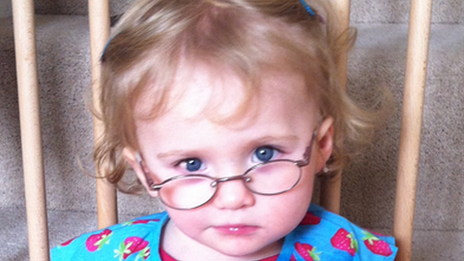Deaf girl fitted with bionic ear speaks her first word
- Published

Evie faced a race against time to undergo the bionic ear procedure
Emily Small told her baby daughter Evie she loved her every day for 22 months, but the girl never heard her mother's words once.
Evie was born profoundly deaf but it was not until she was 16 months old that tests revealed she had no hearing nerves, meaning an auditory brainstem implant - or bionic ear - was her only chance of ever hearing.
The 23-month-old has Oculo-Auriculo-Vertebral Syndrome (OAV), a very rare condition with no known cause, which affects the eyes, ears and spine.
Her parents Emily and David Small, of Horndean, Hampshire, only had weeks to raise funds for Evie, then aged 19 months, to undergo the implant, or face the prospect of a life of silence.
The procedure has to be carried out before children reach their second birthday because pathways in the brain start to close up at this age.
Mr and Mrs Small were initially advised their daughter should undergo a cochlear implant on the NHS in Southampton but after asking for a second opinion they were told Evie had no hearing nerves.
"This meant a cochlear implant would not be an option as there is nothing for the sound to travel through," Mr Small said.
"It would be like having a set of speakers and a stereo but no lead to connect them."
If Evie's parents, who have four other children, wanted their daughter to hear sound, an implant was their only option.
The couple had hoped Evie could be operated on in the UK, where only a handful of bionic ears have been fitted, but a team of specialists could not be assembled until after they successfully secured NHS funding from Portsmouth, which could have taken months.
Following online research the couple, both solicitors, found Professor Vittorio Colletti, a specialist doctor in Verona, Italy, who has successfully fitted more than 90 children with auditory brainstem implants.
'World leading surgeon'
Mr Small, 42, said: "Only a handful of specialist surgeons worldwide can implant the bionic ear. Professor Colletti is the world leading surgeon in this field."
When the couple were told the operation would cost 40,000 euros they set up a trust called Help for Hearing.

Evie was able to speak her first word two weeks after the switch on
Mr Small said they had a cheque from a 93-year-old who said he knew what it was like to be deaf and someone else who gave them £1,000 anonymously.
"Other people raised funds through head-shaves and marathons. Amazingly the donations paid for the operation."
The procedure, which was carried out in Verona on 25 June, saw 12 electrodes fitted on to Evie's brain stem, which feeds sound from a microphone on the outside of her skull, which turns sounds into electronic signals which are then transmitted to the brain.
Just two weeks after switch-on, Evie was able to say her first word "mama".
Mrs Small, 37, said: "It was heartbreaking to hear her speak her first word, it's indescribable to put into words."
She can now hear a wide range of frequencies and is attending speech therapy.
According to her parents she can now hear everything, including words, clearly.
Mrs Small said: "She can actually hear me when I tell her I love her now, but it will take a little time for her to understand exactly what those words mean - it's like teaching a baby from scratch."
Mr Small said Evie was not yet able to enjoy music but said Prof Colletti predicted that she would be able to talk on the telephone in five years.
Evie's parents now hope to send her to Los Angeles for specialist speech therapy. They estimate the total cost of flights and accommodation to the US as well as speech therapy in the UK, will be about £20,000.
Evie will also continue to need intensive speech therapy until at least the age of five or six.
"We are continuing to fundraise for speech therapy charity for other children with no hearing," Mr Small added.
- Published30 May 2012
- Published20 March 2012
- Published16 February 2012
- Published6 February 2012